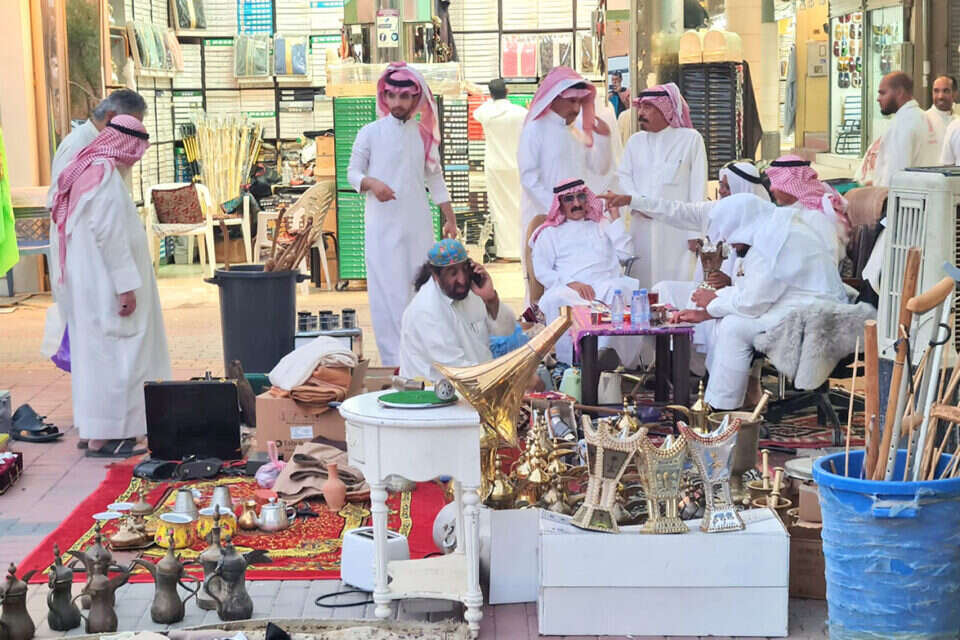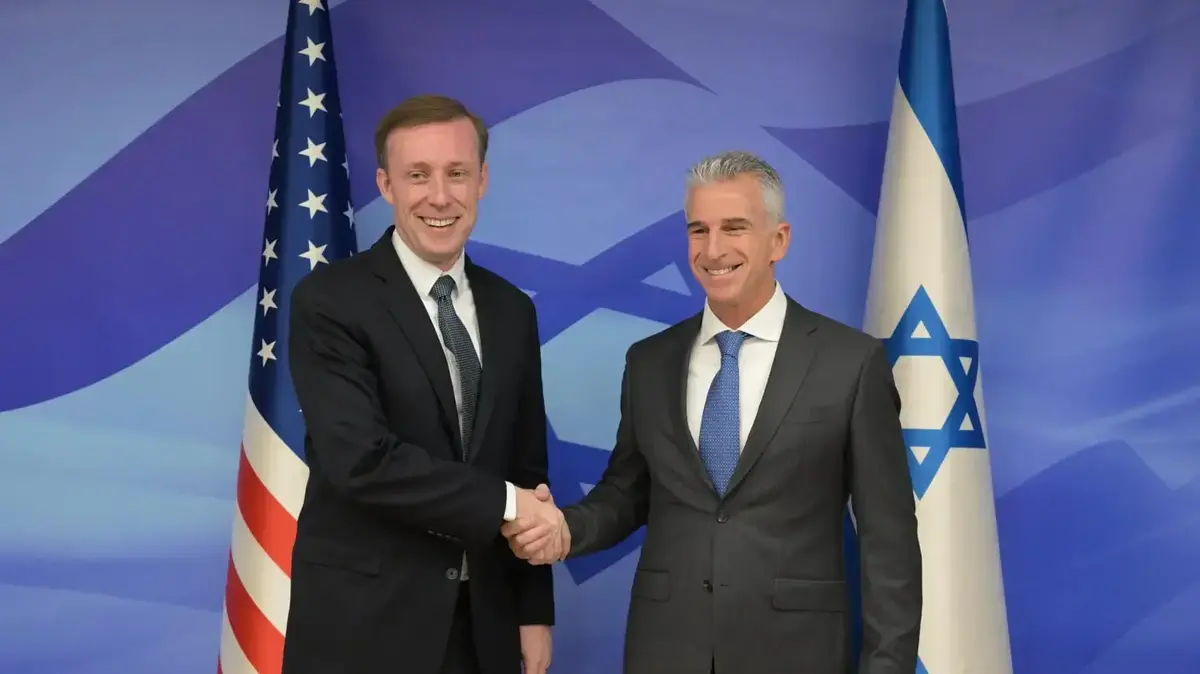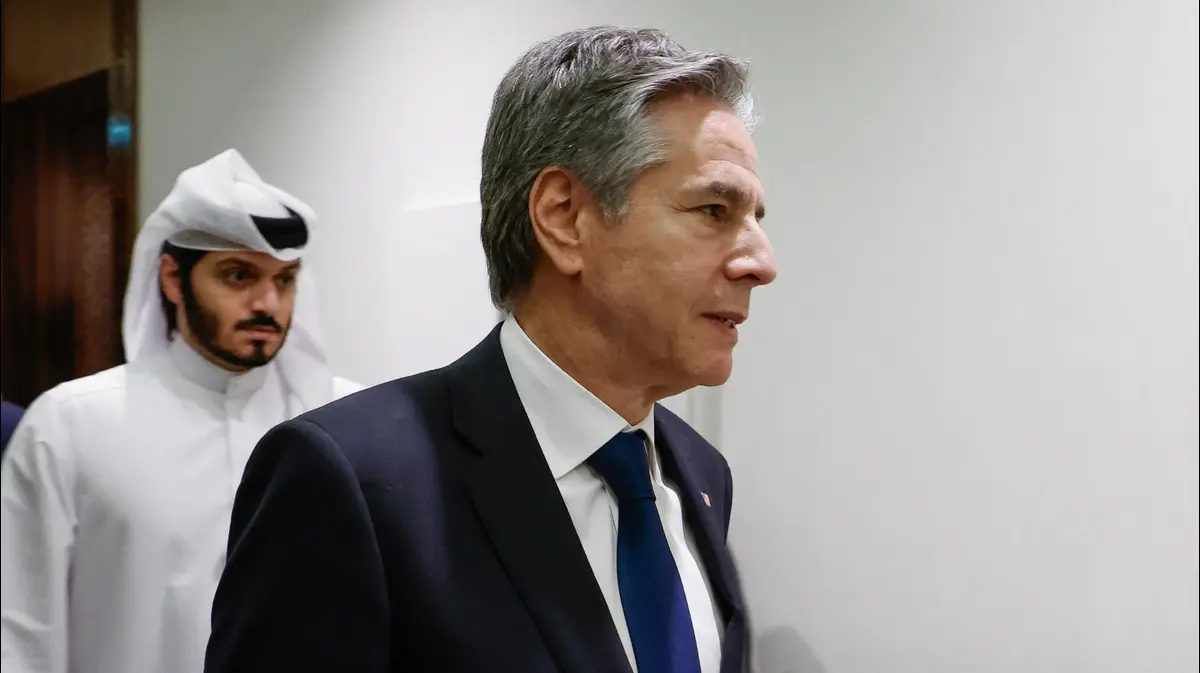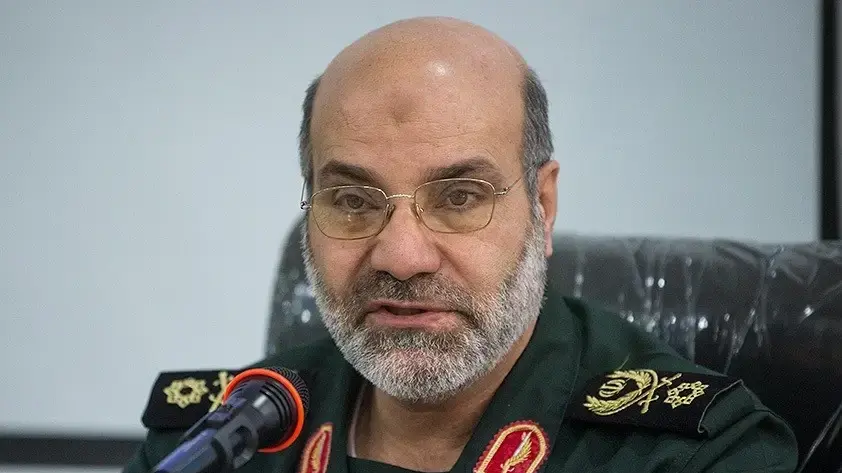In one of the shops in the al-Zal market, a major tourist attraction in Riyadh, several locals sat on chairs and talked.
We smiled at them, and asked how much the galleys cost.
"Where are you from?" The older one asked.
"Israel," we replied.
"Come on, sit down for coffee."
We sat down.
The landlord gestured with his fingers and sent a boy to fetch us coffee.
After a moment the boy came back with Finjen and poured us the cups of local coffee.
It's a different coffee than the one drunk in the West: very light, and bitter.
Dates were served next to him.
"Really Israel?" He asked, after a long silence.
"Really," we replied.
"Welcome," he said.
We talked for a few more short minutes.
There was a combination of tension and curiosity in the air.
We are the first Israelis he has met in his life, and not just him: no one here has seen an Israeli openly (and if he did, he did not know he was an Israeli).
This may also be why we found it easy to speak Hebrew: this language is simply unfamiliar to them.
In Cairo or Amman we would probably have attracted more attention.
Almost everywhere we said we were Israelis.
Intentionally, to get the authentic response.
Even when we applied for visas - with a foreign passport, because with an Israeli passport entry into Saudi Arabia is forbidden - we mentioned our address and phone number in the country, and the profession: journalist.
We did not think that something should be hidden, and in such countries you do not want to be perceived as trying to hide.
The responses we received were surprising.
No one reacted hostilely.
Some reacted curiously and wanted to talk, others panicked and politely turned their backs.
The reactions were largely due to the age of those we spoke to: the older, more religious and conservative, tended to be apprehensive;
Young people, more open to the West and connected to social networks, tended to be intrigued.
In the evening we ate at a local restaurant.
Najd Village offers the full experience.
Sitting on the floor, barefoot of course, fine local food (mostly lamb and chicken, with rice) served on a wide mat.
You can eat with your hands, or with spoons.
All the waiters are men of course, some local and some foreign.
Some areas in the restaurant are partially enclosed, to allow women to eat without a veil.
In the corner next to us sat four young men.
Three of them in galabiyas, and one in western clothes.
We exchanged glances.
They spoke good English, so we asked where the West was from.
"Philippines," he replied.
He came to Riyadh for business, and the locals host him.
One of them asked, "And where are you from?"
We are talking about Israel.
"Welcome," he replied.
We asked him if he was safe.
"Yes," he replied with a smile, "only in a moment I will run away from here" - and burst into embarrassed laughter.
They finished eating before us.
The local young man who spoke to us lingered behind.
He took advantage of the fact that his friends were advancing, and turned to us again.
"Really from Israel?"
We answered yes, and asked for his name.
"Abdullah," he replied, and immediately asked, "But how is that possible, since Israelis are not allowed to come here."
We explained, and he listened with a smile.
"You are welcome here," he said.
"We have to keep our Muslim brothers and so there are problems, but we have no problem with all religions."
We invited him to visit Israel.
"Inshallah," he concluded.
Looking west
Saudi Arabia is very conservative.
Much more than you realize from a distance.
Roughly speaking, only three colors are seen on the street: the white of the galabiyas worn by the men, the black of the galabiyas and veils worn by the women, and the yellow of the desert sand.
It is very rare to see Western foreigners here.
Foreign workers (mostly from the East) are also mostly Muslims.
Religion rules everything here.
The city is full of mosques crowded with people during prayer hours.
Even in malls, which sell the best Western products, instead of music you hear verses from the Koran in the background.
The national airline, Saudi Arabia, utters the Muslim version of "Prayer of the Road" before takeoff, according to Darshan.
The company of course does not serve on its flights alcohol, which is completely forbidden in the kingdom: it is forbidden to sell, it is forbidden to buy, and it is forbidden to drink.
Anyone caught smelling alcohol is likely to be jailed.
Evidence of conservatism, closure, religiosity, can be found on the signage.
The roads have very few signs in English, especially in the center of Riyadh.
As you get to the suburbs, the signs are all in Arabic.
Also all the speed signs on the roads in Arabic literature.
Even in malls - which sell, as mentioned, everything, from Jucci and Prada and Louis Vuitton, to Gap and American Eagle and Adidas - the names of the stores are in Arabic.
In the malls you can see mostly women with children.
The heavy heat drives everyone to the air conditioners.
In the evening, the men also join.
The restaurants in the malls are crowded: the food range in them ranges from different types of burgers (McDonalds, Burger King and Shake Shack star) to pizzas, shawarma and Indian food.
In Riyadh's Grand Mall, the Gallery Mall, there's a children's playground upstairs.
The whole canyon is ornate, and studded with jungle-style vegetation (with figures of neon-lamp animals) and even a gilded camel at the entrance.
The prices in malls are as expensive as in Israel.
Outside, much cheaper.
We asked to visit a local market.
The taxi driver, his favorite, from Bangladesh, took us to a fruit and vegetable market called "Square".
On the way we talked a bit.
He also never met Israelis.
He has been here for several years, living with partners in an apartment in a suburb of Riyadh.
Each of them pays 1,500 rials per month rent (a little less than 1,500 shekels).
"Not cheap here," he complains.
Cucumbers cost in the market 10 reals per two kilograms.
Chili of all kinds costs 5 rials.
Sabers for 25 shekels, peaches for 15, and figs for 20.
Abdullahiz, known in one of the bastions, came from Yemen.
The friend who works with him - from Khartoum, Sudan.
They both chatted with the guests from Israel happily.
The Sudanese, by the way, was wearing a mask.
It stood out because he was the only one we saw with a mask, except for hotel and airport employees.
Just like in Israel, the corona is no longer felt here.
All restrictions have been lifted recently, and entry into the country requires only a certificate that you have been vaccinated.
To avoid the possible medical burden, the Saudis have an interesting method: visa to the country is not cheap.
$ 230 per person.
Its essence consists of compulsory health insurance, which the tourist receives as part of the visa.
The insurance company, they note, is randomly selected by the computer from among several companies that have won the tender.
She undertakes to take care of you in any medical case, including Corona.
It is doubtful whether foreigners who live here regularly have such insurance.
As in the rest of the Gulf states, Saudi Arabia is full of workers from other countries.
But unlike the Emirates or Qatar, in Saudi Arabia they are less noticeable.
This is due to the size of the population: while in the Emirates only about 10 percent of the population is local, and in Qatar something like 15 percent, in Saudi Arabia 80 percent of the population is local.
Riyadh alone is home to 8 million people.
A huge volume, spanning tens of miles.
The size can be seen from the spectacular view on the 99th floor of the Kingdom Center.
An impressive building, more than 300 meters high, that houses a variety of populations: from a magnificent mall on the ground floors, through a hotel and restaurants, to the floors of offices and residences.
The main attraction is of course the lookout.
Getting there costs 69 rials.
A first elevator takes you to the 77th floor, and another elevator to the top floor.
In the elevator we met a group of strangers.
We asked where they were from.
"Russia," they replied.
We wonder what they are doing in Saudi Arabia.
"Because of what is happening in Russia we wanted to leave," they said openly.
The religious dimension is devoutly maintained.
"Israel Hashavua" reporter, Yoav Limor, at the Riyadh Mosque,
From the lookout you can see the line of towers that characterizes the new Riyadh.
Beside him, the old Riyadh.
Hence, it is difficult to hide the gaps: the distribution of wealth in Saudi Arabia is far from egalitarian.
Large sections of the population are poor.
In a country where more than half of the population is under the age of 25, this will be the main challenge for the regent, Muhammad bin Salman.
The steps he has taken in recent years show that he understands this well.
Limited warranty camera
Roads in Riyadh are wide, and also convenient for driving (except during rush hour in the morning and afternoon).
During our stay we only once heard someone honk: a significant difference from the bustling and noisy roads of Cairo, Amman or Ramallah.
Although women have been allowed to drive in Saudi Arabia since 2019, during our stay we saw only one woman driving - wearing a veil of course.
Because of its size, Riyadh is not a pedestrian city.
Anyway, the heavy heat runs you straight to the car air conditioner.
And yet, any attempt to walk can be dangerous.
On some roads there are no sidewalks, and where there are - drivers have not heard of the right of way.
Most cars are packed with families: the man is driving, and with him some women and children.
This can also be seen in malls and flights: one man, and several women walk behind him.
Only when leaving the country do some women allow themselves to be lightened.
The veil falls from the eyes and covers only the head, and one already sees buds of fashionable makeup and glasses.
Obviously, outside the country they already allow themselves to behave freely.
The same is true for men: Bahrain - which is connected to Saudi Arabia by a bridge - is full of Saudis who come to eat, drink alcohol and feel momentarily liberated from the harsh conservatism at home.
This conservatism is evident, of course, especially in mosques.
We visited two: the first, the mosque named after King Khaled.
There were very few worshipers in the morning, but the mosque itself is impressive in appearance: large chandeliers, wide and uniform carpets.
The mosque is, of course, well-air-conditioned, a critical interest in a country where the average temperature in summer months is close to 50 degrees.
From there we continued to the Al-Raji Mosque (which the locals call "Al-Razi").
A much simpler structure, but more popular perhaps because of its central location.
We arrived at noon prayer, and the mosque was filled with many hundreds of people.
We asked if photography was allowed, and we answered in the affirmative.
When we left, we were approached by a local, elderly, very religious person.
"Where are you from, I saw you were taking pictures," he said.
We replied that we had asked for and received permission to take a photo, and for fear of an incident we said we were from Europe.
To our surprise, the man's face was not in conflict.
"My name is Nasser," he said.
"I have a request from you. Read about Islam. Learn. See how good a religion it is."
From the mosque we continued to King Abdullah's palace.
The Bangladeshi driver said photography is allowed, so we tried.
Within a moment, two guards attacked us.
They clarified that it was a private area, and asked to delete the photos.
One of them, Abdulmajd by name, was curious and smiling.
"Your luck that no cops stopped you, otherwise it would have been a mess," he said.
"Be careful not to take pictures where it is forbidden."
Not that we thought of driving differently.
Saudi Arabia is not the place for games.
It is forbidden, for example, to photograph women.
There have already been cases where strangers took pictures on the street, and got into embarrassing situations after it was alleged that there were women in the picture.
It is also forbidden to photograph government buildings: when we arrived at King Salman's Yamama Palace, we drove around it and photographed only from a distance.
In any case, the king is most of the time in his palace in the new city that Saudi Arabia is building on the shores of the Red Sea, Niem.
The presence of the king is felt everywhere.
Each building has a picture of it.
In most cases, next to it is a picture of his son, the regent.
It is part of Saudi Arabia's process of habituation to mark the end of a generation: Salman is the youngest son of 'Abd al-'Aziz Ibn Saud, the man who conquered and united Saudi Arabia at the turn of the last century.
From the time of Ibn Saud's death in 1953 until today, power has passed between several of his sons.
Ben Salman will be the first of the third generation - the grandchildren of the founder - to rule the country.
It will be not just a leap of a generation, but a dramatic change in mentality.
Salman, the current king, is 87 years old, and grew up in the shadow of the religious religiosity and meticulous conservatism of his country, which is entrusted with the sanctuaries of Islam.
His son has already grown up in the social media generation, and understands Saudi Arabia’s need to change, open up and connect to the world.
Israeli foot in the door
Relations with Israel are part of that.
The Saudis have maintained quiet relations with Israel in recent decades, but in the last decade there has been an escalation - in Saudi terms of course, meaning a small step at a time.
Thus, Saudi Arabia was visited by all the heads of the Mossad, from Meir Dagan, the heads of the National Security Council, chiefs of staff and generals.
Israel also wants security, but of a different kind.
Saudi Arabia is the largest, most important and richest country in the region.
Israel wants to make sure it stays on the Western side, and does not squint in the direction of Russia, China and Iran.
Although the Saudis have relations with all of them, they consider Shiite Iran to be the biggest threat to them.
The Iranian nuclear project worries Riyadh even more than Jerusalem: Saudi Arabia does not have the Israeli deterrence, it does not have the Israeli nuclear, and it does not have the umbrella of the American automatic defense.
It has a nuclear defense umbrella for Sunni Pakistan, which Saudi Arabia has funded as part of its nuclear program.
Saudi Arabia suffered the worst attack in Iran in its history, in September 2019, when dozens of Iranian drones and cruise missiles hit the facilities of the Saudi National Oil Company, Aramco. From the understanding that the plight of the Iranian masses is in this case indeed half a consolation.
As part of tightening these relations, Israel will approve the transfer of the islands of Tiran and San to Saudi Arabia.
Some in Israel opposed it: Contrary to the automatic thought that Saudi Arabia is far away, its northwest coast on the Red Sea is only 50 km from Eilat. Therefore, it was important for Israel to ensure that freedom of navigation in the Red Sea was maintained in any situation; The official announcement is expected during a visit to President Biden's area next week, but those who expect peace to follow will be disappointed. It will take time for the Saudis to move slowly, step by step.
What is happening today is a foot in the door, a first visible move.
The main thing, meanwhile, at least, will continue to be conducted in secret.
From security and intelligence collaborations, to security and other deals.
Israeli companies are already recognized in Saudi Arabia - usually through companies registered in third countries - and Israel has a clear interest in expanding this business in the future in light of the enormous economic potential inherent in ties with the kingdom.
The portrait of King Salman is emblazoned on the banknotes in Saudi Arabia.
There are banknotes with values from 1 to 500 rials, and coins with smaller values.
At the entrance we exchanged money, for fear that our Israeli credit card would not be accepted, but it worked.
The Israeli telephone, on the other hand, is blocked in Saudi Arabia in the absence of communication agreements between the countries.
At the entrance we bought SIM cards, through which we communicated with the country in the variety of apps - WhatsApp, Telegram and Signal - which are very popular here.
In the evening we returned to the al-Zal market.
It is located next to the Masek Fortress, which was conquered by 'Abd al-'Aziz on his way to conquer all of Riyadh.
Because of the heavy heat, the fort and market are open until 12, and from four in the afternoon until evening. When the heat goes down a bit, people go out into the street. The indoor market also gives them some shade: Or in shops that sell gold. Everything is very cheap here, but also very touristy. The more popular part is in the foothills of the market, where a kind of small flea market is spread out on the floor.
Another Middle East
When it gets dark, quite a few locals come to the fountain show in Abdullah Park.
You see there mostly families with children, and also some foreign workers who went out to freshen up.
Admission costs 11.5 rials, and the value is quite impressive.
While this is not Burj Khalifa's "biggest, tallest" fountain show in Dubai, it's exactly Saudi Arabia: putting in less effort, and showing off less.
At breakfast at the hotel, the waiter turned out to be a Palestinian from Jordan.
His smile betrayed the fact that he probably recognized where we were coming from, but he did not say a word.
In contrast, the taxi driver on the way to the airport, a Pakistani from the city of Peshawar, was stressed when we told him we were from Israel, and wrapped himself in silence.
Understandable, and not surprising: Many, especially foreigners, really do not want to get into trouble.
But as far as a quick visit is concerned, Israel is no longer a synonym here for trouble.
A mural of King Salman and the regent,
Officially, the Saudis are still committed to the Palestinians, and especially to religious conservatism, but in practice they are moving in our direction.
It will take years, but the process is important: each time one small step is visible, and many secret steps behind it.
One of the steps to be taken during President Biden's upcoming visit will be the establishment of a regional defense alliance against missiles and rockets.
This is a particularly ambitious project: it will take years to connect all the warning and detection systems of all countries, and there will be quite a few problems along the way (from technologies to information security).
But what matters is the process;
It symbolizes that Israel is already an integral part of the region.
No longer the problem, but in many ways - the solution.
Biden's visit is set to put an end to the case of the assassination of journalist Jamal Hashukaji, and restore relations with Muhammad bin Salman, who has so far been assigned to Washington.
The administration is not doing this out of love, but out of a lack of choice: the global oil crisis following the war in Ukraine is forcing it to make a pilgrimage to Saudi Arabia, hoping it will agree to increase output and sales to bring prices down.
When former President Donald Trump arrived in Riyadh, early in his presidency, he was greeted with a "sword dance."
Biden will come to Jeddah for the "oil dance" and hope on the way to leverage the achievements in Israel-Saudi relations.
Its success will largely determine the future pace at which relations between the two countries will progress.
And yet - as a former senior Israeli official who knows Saudi Arabia well said this week - Israeli pressure is bad.
"Saudi Arabia is not a fling. This is someone we want to marry for life. It is better to act slowly, in thought, and not make mistakes. And if things do not happen now, but in two years, it's bad"?
A visit to Riyadh gives the answer.
Things happen at their own pace.
Israelis in Saudi Arabia is no longer an impossible dream.
Slowly more will arrive, especially businessmen with foreign passports.
The atmosphere will be thawed, the news will be broadcast in a different tone, and the locals will get used to it.
As the seller of sandals in the market said, when he asked where we were from, "Israel? Very good. Tell everyone to come."
It is not certain that all Israelis will be able to come to Saudi Arabia soon, or at all, and in any case - the average tourist has very little to do in this conservative and religious country.
But in strategic terms, what is happening today between Jerusalem and Riyadh is surprising, no less.
The ability to walk around Riyadh openly, as an Israeli, and speak Hebrew, shows how deep and rooted the change the region is going through.
This is not a new Middle East, but a different Middle East.
If Israel does not make a mistake or hurry, it will reap its fruits, and in a big way.
Were we wrong?
Fixed!
If you found an error in the article, we would love for you to share it with us




/cloudfront-eu-central-1.images.arcpublishing.com/prisa/5CYUPDL33BHRNA5AWKOZ3OGFK4.JPG)



